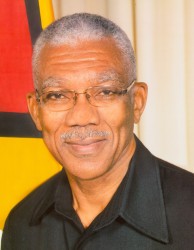President David Granger yesterday said it is impossible to reverse the deterioration in national security after just three months in office.
“There has been a marked deterioration in human safety… and it is impossible to turn the tides in just over three months,” Granger said during an interview broadcast on the National Communications Network (NCN) last evening.
The rise in the crime rate began roughly 15 years ago under the administration of former president Bharrat Jagdeo, Granger said, while noting that the police force was weak and it was kept weak.

The Granger administration has been faced with a continued upsurge in crime in several parts of the country. It has said the police had been reporting an increase in crimes since February, before the new government took office.
Granger also said that there has been a more efficient reporting system by the police, which may be responsible for their reporting of a higher crime rate.
Some of the recent killings, the president said, were engineered criminal activity and he specifically mentioned the murder of political activist Courtney Crum-Ewing.
Granger, however, pointed out that Guyanese will be able to live in a safer environment as the government is working to strengthen the police force.
Other areas of focus will be piracy, improved policing groups and patrols.
Marine vessels going out should be equipped with the necessary technology which should indicate their location in the event of a piracy, the president said.
He also noted the need for aerial surveillance and air and surface craft, which he said will significantly contribute to the reduction of piracy.
Emphasis will also be placed on training of police officers and equipping them with the necessary tools needed for their jobs, the president said, while he added that the policing groups must comprise competent officers who will work in collaboration with the police force.
An increase in the salaries for policemen and women should also serve as a boost to encourage the police to work harder, he added.
During the interview, Granger defended a decision to grant pardons to around 40 young offenders, while saying their release has no bearing on the recent apparent upsurge of crimes.
Granger noted that there was a very careful selection of the youths and there were conditions which were required for the amnesty. Violent offenders or persons dealing with any type of hard drugs were not considered for the pardon, the president said.
The youth offenders were released in June and Prison Director Welton Trotz said that they have since been accepted into the USAID’s Skills and Knowledge for Youth Employment (SKYE) Project.
Trotz said that initially 60 youth prisoners had been identified but it was later discovered that some did not meet the specified 15 to 25 age range, while some of the offences they were convicted for were serious. Granger had said that only those convicted of non-violent offences would be considered for presidential pardons.
Trotz said before release each of the offenders was interviewed by SKYE representatives and “they have been identified for certain training programmes which are being done regionally.” He explained that wherever the pardoned prisoners live there are SKYE facilitators there to conduct the required training.
USAID had made a proposal to Attorney General Basil Williams by way of a letter to have those pardoned enrolled in the SKYE Project.
Presidential pardons will be issued on an annual basis.





